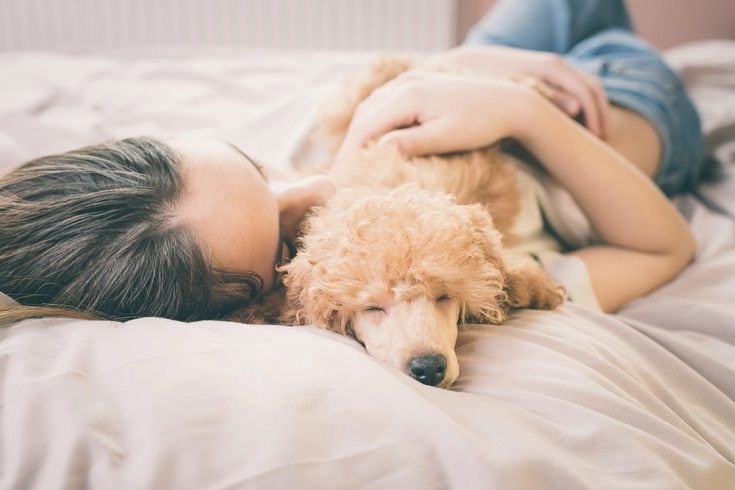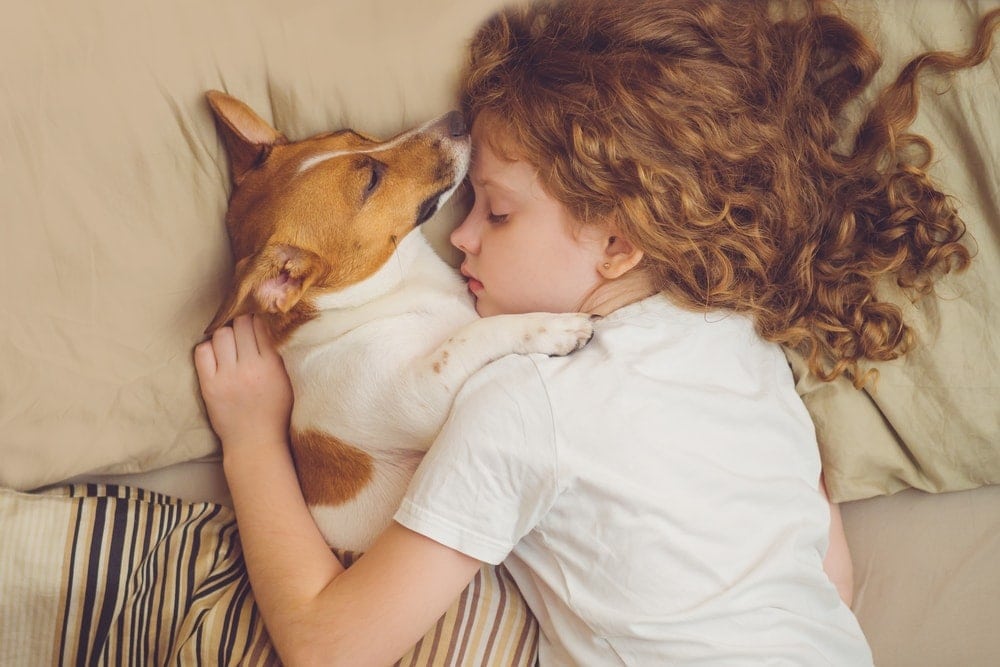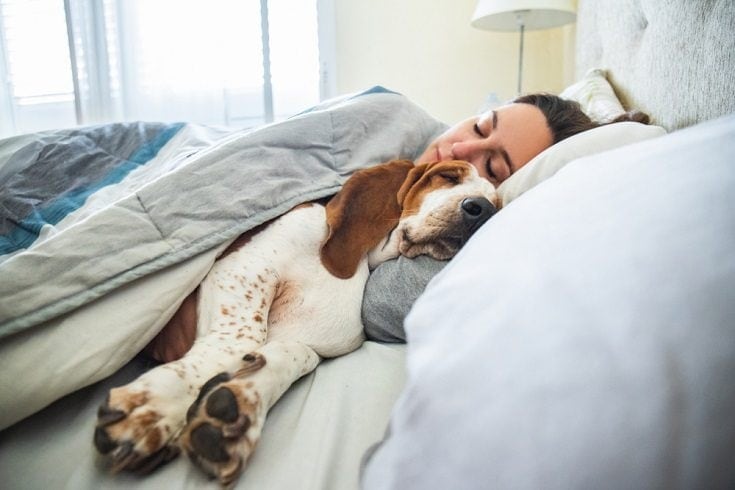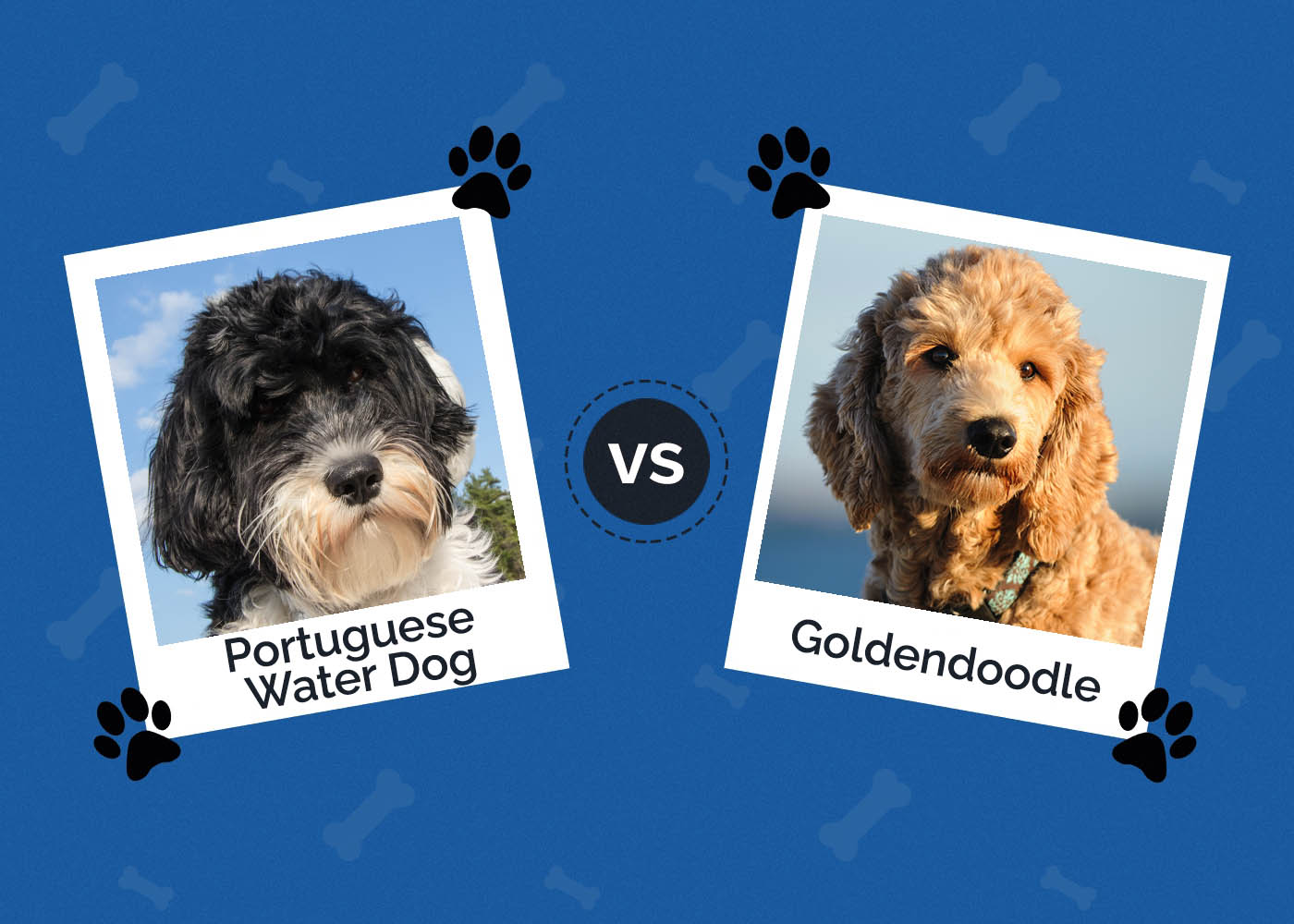Why Does My Dog Sleep on My Head? 4 Reasons & What to Do

Updated on

As dog owners, we love it when our furry friends want to be with us. Cuddling up on the couch at the end of a long day with our four-legged companions is a great way to relax and unwind. Sometimes, your pooch has other ideas and decides that you’ll make a great pillow. It may seem that they’d rather lay on top of you than on the couch. While it can be cute, some forms of this behavior can indicate underlying behavioral issues or anxieties that need to be dealt with.
In this article, we’ll explain the origin of a dog’s desire to sleep on its owner’s head and give four possible reasons your dog might be using you as furniture. In the end, we’ll provide some ideas for how you can train your dog to replace this behavior with something a little less intrusive.
The 4 Reasons Your Dog Sleeps On Your Head
1. Social Status
Dogs live in structured packs with a clear hierarchy, meaning there is a pecking order and one dog, called the alpha, is in charge. Many complicated, interrelated factors determine social status in a pack, but the important result of this structure is that dogs are constantly jockeying for position and trying to move up the ladder. Being nearer to the top affords a dog better feeding and mating opportunities, increasing their chance to pass on their genes successfully.
So, what does this have to do with sleeping on your head? From your dog’s perspective, sleeping near the leader of the pack—most likely you—will raise their rank in the eyes of the other members of your “pack.” Sleeping on top of you or on your head can be a signal to other pack members to back off since your dog is clearly near the top.
2. Separation Anxiety
A common cause of sleeping near or on top of your head is separation anxiety. If your dog is extremely attached to you, they might get nervous when they’re removed from your presence, even by just a few feet.
In extreme cases, dogs with separation anxiety will follow their owners around the house and will whine and bark if they’re left in a room by themselves.
If you suspect your dog has separation anxiety, you need to take steps to help them overcome it so they can live normal, happy dog lives. A full guide on handling separation anxiety is beyond the scope of this article, but the general plan is to increase the amount of time you and your dog spend apart slowly over time. Rewarding your dog when they don’t react to you leaving is a great way to train them to associate you leaving with a positive experience.

- Related Read: Best Dog Crates For Separation Anxiety – Reviews & Guide
3. Being Protective
Another common reason your dog sleeps near your head is that they’re trying to protect you. Ancestral dogs evolved to be pack animals partially because of the simple wisdom of strength in numbers. The dogpile is an example of wild dogs keeping each other warm and protecting themselves from predators.
It can be difficult to tell for sure if your dog is sleeping on your head because they’re being protective, but one telltale sign is if the behavior happens more often when other people are around. Dogs prone to being overprotective tend to exhibit the behaviors when other people are around since they perceive them as potential threats.
4. Your Dog Was (Inadvertently) Trained To
Most dogs are fast learners and can pick up on our habits quickly. Reinforcement training is most often done with treats, but toys and attention are also valuable enough rewards that your dog could learn some behaviors by accident.
Consider the following scenario. Your dog hops up on the bed, slinks over to your head, and plops down. If you respond by scratching their head and giving them a pet, they will learn to associate the behavior of sleeping near your head with the positive experience of getting pets. Over time, this behavior becomes ingrained, and you’re left scratching your own head wondering what happened.

How to Break the Habit of Dogs Sleeping On Your Head
The simplest way to get your dog to sleep off your head and in a more suitable place is to train them by positively reinforcing the behavior you want. A good start is to notice when your dog lies down where you want them to sleep and reward them with a treat or their favorite toy. You can artificially create this situation by leading them to the spot, or you can wait and react when they go there by chance.
One thing you don’t want to do is use negative reinforcement. It is important to recognize that sleeping on your head is usually nothing more than normal dog behavior, and using negative reinforcement like yelling or forcibly removing them could create a host of other behavioral and trust issues.
If you suspect that separation anxiety is the cause, you’ll need to address that underlying problem directly. The general approach for treating separation anxiety is to acclimate your dog slowly to associate your leaving with positive experiences. Start by going through parts of your leaving routine and reward the dog with treats when they don’t react. Eventually, your dog will learn that your leaving is a positive experience and become more comfortable with being separated from you.
Conclusion
Wild dogs live in packs, sleep together in a big lump, and regularly assert their dominance by sleeping near or on top of high-ranking members of the pack. Your dog might be tapping into its ancestral roots when they sleep on your head, but they could also simply have learned the behavior from you. The most insidious cause of sleeping on your head is separation anxiety, but even then, you can still train your dog to stop sleeping near your head by addressing the root cause.
The most important thing to remember when training your dog to change its behavior is to have patience. Dogs don’t have the same attention spans we do, and it can be stressful when they sense your frustration. Train in short sessions and take many fun breaks to play or go for a walk; both you and your fuzzy companion will be happier.
See Also:
- Why Does My Australian Shepherd Sit on Me So Often?
- How Many Hours Does a Dog Sleep? The Answer is Fascinating!
Featured Image Credit: Rasulov, Shutterstock











